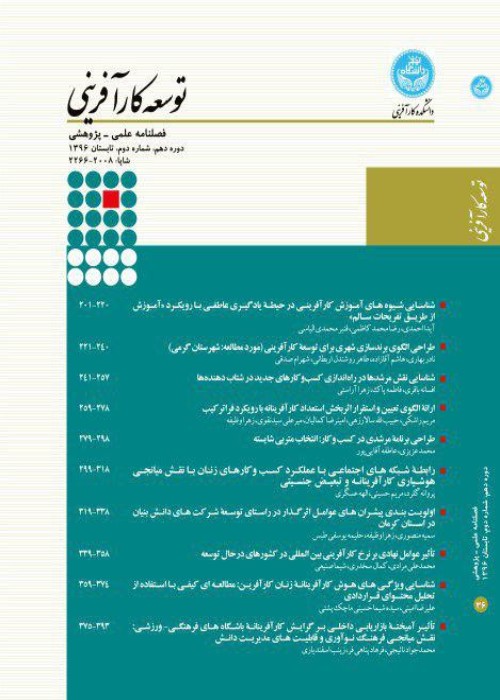A Conceptual Model of Employability Skill for Technology and Knowledge-Based Enterprise
Author(s):
Article Type:
Research/Original Article (دارای رتبه معتبر)
Abstract:
Objective
In today's competitive and contemporary world, unemployment has become a worrying issue and has had a profound impact on all aspects of an economy, culture, and society. In this regard, concern about employment is increasing day by day, and the trends of globalization, technological advances, and population growth have had a profound impact on the labor market. The Province of Ardabil, despite its abundant resources, is no exception to this, and is facing many problems in the field of economy and employment. Unemployment in the Province of Ardabil has become one of the most important challenges facing this region, and strategies such as employability skills that reduce unemployment in this province have been the focus of researchers and policy makers. Therefore, the present study was conducted with the aim of designing a model of employability skills for technology and knowledge-based units based on the Strauss and Corbin approach (1989).Method
The present study has a qualitative approach and uses the grounded theory. The statistical population of the study was the technology and knowledge-based units of Ardabil Province, from which 20 faculty members, entrepreneurs, and experts were selected using purposive sampling and semi-structured interviews. The interviews were conducted until theoretical saturation (15 interviews). The time-frame of this study was also between 2022 and 2023, and open, axial, and selective coding’s were used to analyze the data.Findings
The data collected through interviews and the grounded theory were analyzed. The results of this study indicate the presentation of a model of employability skills for technology and knowledge-based units in Ardabil Province, which ultimately led to the identification of 6 key concepts in the form of 34 subcategories and 19 categories and 6 main categories of strategic factors, causal conditions (macro and micro), contextual factors (educational, infrastructural and supportive), core category (soft and hard skills), intervening variables (individual, experiential and developmental), strategy (reducing bureaucracy, strategic insight, reviewing educational content, etc.) and outcome (increased employment and job diversity, specialization, equal opportunity creation, matching between labor market and skills).Conclusion
Introducing the employability skills model can be used by policymakers and stakeholders in technology and knowledge-based companies in addition to increasing the employability of young people. Therefore, attention to employability and acquiring skills in this field is one of the important issues that should be made a priority for the organizations concerned. In general, it can be said that the introduced model explains mechanisms that led to individual growth and prosperity, specialization in occupations, improvement in employability skills, increased employment of young people, creating equal opportunities for employment, increasing interest in business and entrepreneurship, matching between market needs and skills and increased job diversity in the target community and similar companies.Keywords:
Language:
Persian
Published:
journal of Entrepreneurship Development, Volume:16 Issue: 3, 2023
Pages:
47 to 65
https://magiran.com/p2660548
دانلود و مطالعه متن این مقاله با یکی از روشهای زیر امکان پذیر است:
اشتراک شخصی
با عضویت و پرداخت آنلاین حق اشتراک یکساله به مبلغ 1,390,000ريال میتوانید 70 عنوان مطلب دانلود کنید!
اشتراک سازمانی
به کتابخانه دانشگاه یا محل کار خود پیشنهاد کنید تا اشتراک سازمانی این پایگاه را برای دسترسی نامحدود همه کاربران به متن مطالب تهیه نمایند!
توجه!
- حق عضویت دریافتی صرف حمایت از نشریات عضو و نگهداری، تکمیل و توسعه مگیران میشود.
- پرداخت حق اشتراک و دانلود مقالات اجازه بازنشر آن در سایر رسانههای چاپی و دیجیتال را به کاربر نمیدهد.
In order to view content subscription is required
Personal subscription
Subscribe magiran.com for 70 € euros via PayPal and download 70 articles during a year.
Organization subscription
Please contact us to subscribe your university or library for unlimited access!



